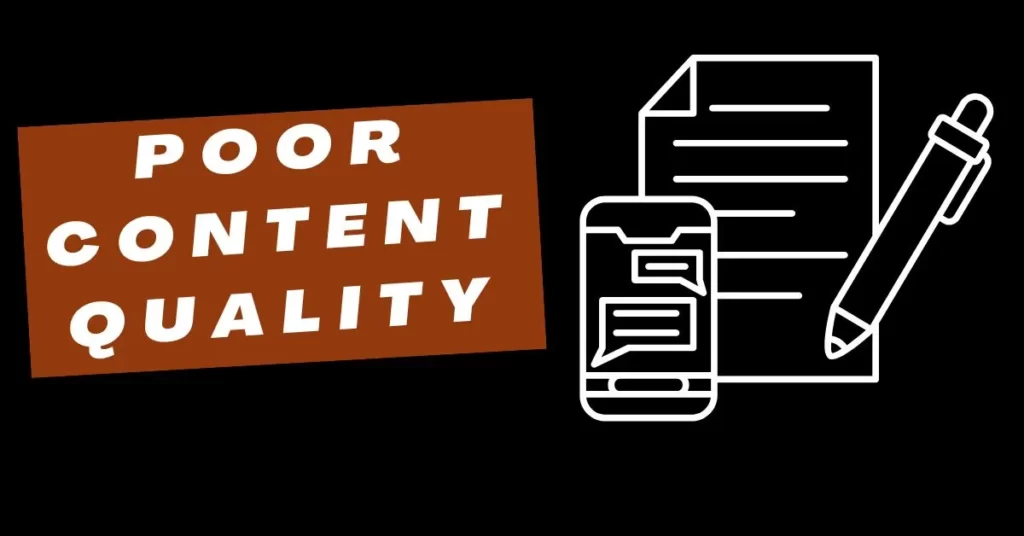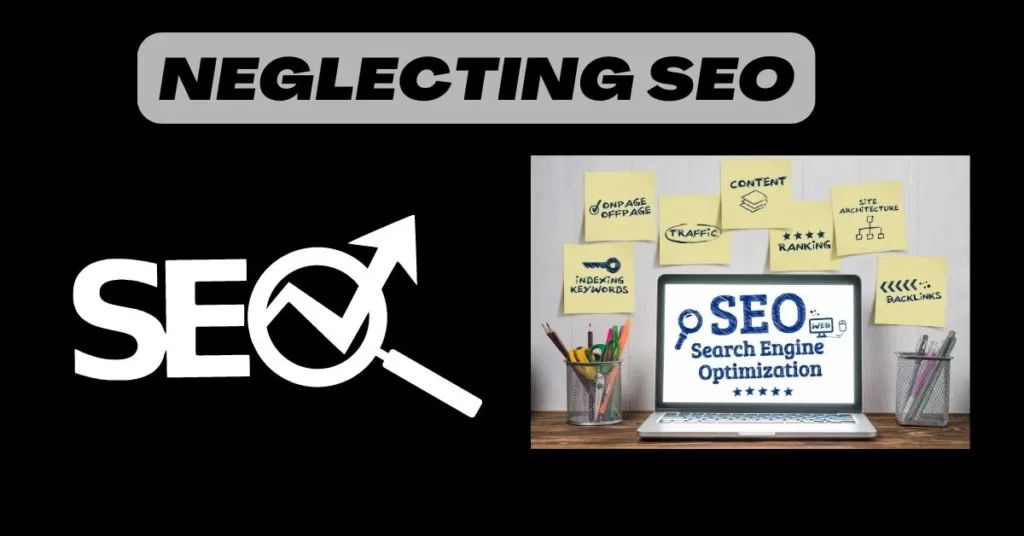
Blogging has become a popular platform for sharing ideas and engaging with audiences worldwide. However, success in the blogosphere requires more than just captivating content.
In this article, we will explore the most common mistakes bloggers make and provide valuable insights and tips for beginners and seasoned bloggers alike. From planning to monetization, we’ll cover crucial aspects that can make or break a blog’s success.
By understanding these mistakes, you’ll be able to avoid them and elevate your blogging journey to new heights. Let’s dive in and uncover these pitfalls, and most importantly, learn how to steer clear of them.
Table of Contents
Explore Common Mistakes Bloggers Make
Lack of Planning and strategy
Importance of having a clear vision and purpose:
Having a clear vision and purpose is essential for any blogger aiming to create a unique and informative blog. Without a well-defined plan in place, bloggers often find themselves lost in a sea of content, struggling to differentiate themselves and provide valuable information to their readers.
A clear vision acts as a compass, guiding bloggers toward their desired destination and helping them stay on track amidst the overwhelming abundance of information available. Moreover, a well-defined purpose serves as a driving force, igniting passion and motivation within the blogger to consistently deliver high-quality, informative content.
By establishing a clear vision and purpose, bloggers can carve out their own unique niche, providing readers with fresh perspectives, valuable insights, and practical solutions to their problems. This not only sets them apart from the crowd but also allows them to establish credibility, build a loyal audience, and make a lasting impact in their chosen field.
Ultimately, a clear vision and purpose empower bloggers to create truly unique and informative content that resonates with their readers, enriches their lives, and establishes their authority as trusted sources of information.
Failure to define the target audience and nice :
In addition to the common mistake of lacking a clear vision and purpose, another crucial aspect that bloggers often overlook is failing to define their target audience and niche. It is essential to deeply understand who your readers are and what they are genuinely interested in.
By thoroughly researching and identifying your target audience, you can tailor your content to meet their specific needs and preferences. This level of personalization enables you to create relevant and engaging blog posts that resonate with your readers on a deeper level.
Furthermore, narrowing down your niche is equally important. Instead of attempting to cover a broad range of topics, focusing on a specific area allows you to establish yourself as an authority in that particular field.
This specialization not only sets you apart from other bloggers but also helps you build credibility and gain the trust of your audience. By consistently delivering valuable and insightful content within your niche, you become a go-to resource for your readers, increasing their loyalty and engagement.
Defining your target audience and niche is a strategic approach that ensures your efforts are targeted and effective. It allows you to align your content with the interests and needs of your audience, ultimately resulting in a stronger connection and a higher level of engagement.
By consistently providing relevant and valuable information to your specific target audience, you establish yourself as a trusted source of expertise, leading to long-term success in the blogging world.
Inconsistency in publishing schedule:
Consistency is key when it comes to successful blogging, yet many bloggers struggle with maintaining a regular publishing schedule. Inconsistent posting can lead to a decline in readership and engagement.
It’s important to establish a realistic publishing schedule that works for you and stick to it. Consistency not only helps you build trust with your audience but also improves your search engine rankings over time.
By recognizing the significance of planning and strategy, bloggers can avoid these common mistakes and set themselves up for long-term success. Taking the time to define your vision, identify your target audience, and maintain a consistent publishing schedule will lay a strong foundation for your blog and increase your chances of reaching your blogging goals.
Poor content quality

Lack of originality and uniqueness:
One of the most detrimental mistakes bloggers make is producing content that lacks originality and uniqueness. With countless blogs available on the internet, it’s crucial to offer something fresh and distinctive to capture readers’ attention. Simply regurgitating existing information or replicating what others have already done can lead to a loss of interest from your audience. Strive to bring your unique perspective, ideas, and voice to your content to stand out from the crowd.
Failure to provide value to readers:
Providing value to your readers should be at the core of your blogging efforts. Unfortunately, many bloggers fall into the trap of creating content that doesn’t offer anything meaningful or useful to their audience. It’s important to understand your readers’ pain points, interests, and needs and create content that addresses those aspects. By offering valuable insights, actionable tips, or entertaining stories, you can establish yourself as a trusted source and keep readers coming back for more.
Ignoring proper grammar, spelling, and formatting:
Poor grammar, spelling mistakes, and sloppy formatting can significantly diminish the quality of your content. Bloggers who neglect these aspects risk appearing unprofessional and may lose credibility with their audience. It’s crucial to proofread your content thoroughly, use proper grammar and spelling, and ensure your formatting is clean and visually appealing. A polished and well-presented blog post not only enhances readability but also reflects your commitment to delivering quality content.
By avoiding these content-related mistakes, bloggers can elevate the overall quality of their blogs and enhance reader engagement. Strive for originality, offer value to your audience, and pay attention to grammar, spelling, and formatting to ensure your content stands out and resonates with your readers. Remember, high-quality content forms the foundation of a successful blog.
Will the Blogging Industry End Soon? Find it here.
Neglecting Search Engine Optimization (SEO)

Importance of optimizing blog posts for search engines:
Search Engine Optimization (SEO) plays a vital role in driving organic traffic to your blog. Neglecting SEO is a common mistake bloggers make, as it can limit their visibility and reach. By optimizing your blog posts for search engines, you can improve your chances of ranking higher in search results and attracting relevant readers. Understanding the basics of SEO, such as keyword usage, meta tags, and internal linking, is crucial for maximizing your blog’s exposure.
Lack of keyword research and usage:
Keyword research is a fundamental aspect of SEO that many bloggers overlook. By identifying the keywords and phrases that your target audience is searching for, you can optimize your content accordingly and increase the likelihood of appearing in relevant search results. Neglecting keyword research and failing to incorporate targeted keywords into your blog posts can result in missed opportunities for organic traffic and visibility.
Poor meta descriptions and title tags:
Meta descriptions and title tags are essential elements of your blog posts that appear in search engine results. However, bloggers often make the mistake of neglecting these elements or not optimizing them effectively. Crafting compelling meta descriptions and title tags that accurately represent your content and include relevant keywords can significantly impact click-through rates and improve the visibility of your blog posts in search results.
By understanding and implementing SEO best practices, bloggers can enhance their blog’s visibility, increase organic traffic, and reach a wider audience. Taking the time to optimize blog posts for search engines, conducting thorough keyword research, and paying attention to meta descriptions and title tags can make a significant difference in attracting the right readers and growing your blog’s reach.
Ineffective Promotion and Marketing
Failure to utilize social media platforms:
Social media platforms provide bloggers with powerful tools to promote their content and engage with their audience. However, many bloggers make the mistake of neglecting or underutilizing social media for promotion. Establishing a strong presence on platforms relevant to your niche, such as Facebook, Twitter, Instagram, or LinkedIn, can help you expand your reach, drive traffic to your blog, and foster meaningful connections with your audience.
Lack of engagement with the blogging community:
Building relationships within the blogging community is a crucial aspect of successful promotion. However, some bloggers isolate themselves and fail to engage with their peers. Actively participating in the blogging community by commenting on other blogs, collaborating with fellow bloggers, and joining relevant online communities can help you establish your presence, gain exposure, and attract a wider audience.
Insufficient promotion strategies:
Bloggers often overlook the importance of implementing diverse and effective promotion strategies. Relying solely on organic search traffic or sporadic social media posts may limit your blog’s growth potential. It’s essential to develop a comprehensive promotion plan that includes various channels such as guest blogging, email marketing, influencer collaborations, and content repurposing. By diversifying your promotional efforts, you can expand your reach, attract new readers, and increase the visibility of your blog.
By avoiding these promotion and marketing mistakes, bloggers can amplify their blog’s exposure, reach a wider audience, and increase engagement. Embracing social media platforms, actively engaging with the blogging community, and implementing diverse promotion strategies will help you establish a strong online presence, attract organic traffic, and foster a thriving community around your blog.
Neglecting Audience Engagement
Ignoring comments and feedback:
Neglecting audience engagement by disregarding comments and feedback is a common mistake made by bloggers. Engaging with your audience is essential for building a loyal community and fostering a sense of connection. Responding to comments, addressing questions, and appreciating feedback not only shows your readers that you value their input but also encourages ongoing interaction and discussion.
Not responding to reader inquiries and messages:
Another mistake bloggers make is failing to respond to reader inquiries and messages. Whether it’s through email, social media, or other communication channels, promptly acknowledging and addressing reader inquiries demonstrates your commitment to fostering a positive reader experience. Engaging with your audience on a personal level helps establish trust, loyalty, and a strong relationship between you and your readers.
Failure to build a loyal community:
Building a loyal community around your blog requires intentional effort and continuous engagement. Neglecting this aspect can hinder the growth and success of your blog.
Encouraging reader participation through discussions, polls, or even hosting online events can help create a sense of belonging and encourage readers to become advocates for your blog. Nurturing a loyal community not only boosts reader engagement but also facilitates word-of-mouth promotion and can lead to sustained blog growth.
By actively engaging with their audience, responding to comments and feedback, and building a loyal community, bloggers can create a vibrant and interactive space around their blog.
Prioritizing audience engagement fosters a sense of community, strengthens reader relationships, and encourages ongoing participation and support. Remember, blogging is not just about producing content but also about building connections with your audience.
Monetization Mistakes
Relying solely on ad revenue:
One of the most common monetization mistakes bloggers make is relying solely on ad revenue as their primary income stream. While ads can generate some income, depending solely on this revenue source may not be sustainable or lucrative in the long run.
Bloggers need to explore and diversify their monetization strategies beyond ads, such as affiliate marketing, sponsored content, digital products, or services related to their blog’s niche.
Poorly chosen affiliate partnerships:
Affiliate marketing can be a lucrative way to monetize a blog, but bloggers often make the mistake of entering into poorly chosen affiliate partnerships. Promoting products or services that are irrelevant to your audience or don’t align with your blog’s values can lead to a loss of trust and credibility. It’s crucial to carefully select affiliate partnerships that genuinely add value to your readers and align with your blog’s niche and target audience.
Lack of diversification in revenue streams:
Relying on a single income stream can be risky for bloggers. A common mistake is neglecting to diversify revenue streams. By exploring multiple monetization avenues, bloggers can protect themselves from fluctuations in ad revenue or changes in affiliate partnerships.
Diversification can involve offering digital products, creating online courses, providing consulting services, or even hosting events. This not only increases income potential but also offers a more stable and sustainable income model.
By avoiding these monetization mistakes, bloggers can build a more robust and sustainable income from their blogs. Diversifying revenue streams, carefully selecting affiliate partnerships, and exploring various monetization strategies help bloggers maximize their earning potential while providing value to their audience.
Remember, monetization should be approached strategically, keeping both the readers’ interests and the blog’s long-term growth in mind.
Neglecting Analytics and Tracking

Importance of monitoring blog performance:
Neglecting to monitor blog performance through analytics is a common oversight made by bloggers. Analytics provide valuable insights into various aspects of your blog, such as website traffic, audience demographics, popular content, and user behavior. By analyzing these metrics, you can understand what resonates with your audience, identify areas for improvement, and make data-driven decisions to enhance your blog’s performance.
Failure to analyze data and make informed decisions:
Simply collecting data is not enough; it’s crucial to analyze and derive meaningful insights from the information gathered. Bloggers often make the mistake of neglecting data analysis, which hampers their ability to optimize their blogs effectively.
By studying key metrics and trends, you can identify patterns, understand user preferences, and tailor your content and strategies accordingly. This data-driven approach allows you to make informed decisions that can lead to improved engagement, increased traffic, and better overall blog performance.
Ignoring the impact of metrics on growth:
Another critical mistake made by bloggers is the tendency to ignore the impact of metrics on their blog’s growth. Metrics and data provide valuable insights into the performance and success of a blog, yet some bloggers fail to recognize their significance and neglect to leverage them effectively.
By disregarding these metrics, bloggers miss out on opportunities to track progress, identify areas of improvement, and make data-driven adjustments that can enhance their blog’s growth potential.
Monitoring key performance indicators (KPIs) is essential for measuring the success of your blog. Metrics such as page views, conversion rates, subscriber growth, bounce rates, and engagement levels offer valuable information about your audience’s behavior and preferences. They provide insights into what content resonates with your readers, which marketing strategies are effective, and which areas need improvement. By regularly analyzing these metrics, you can gain a better understanding of your blog’s strengths and weaknesses, allowing you to make strategic decisions that support growth.
Furthermore, by paying attention to metrics and data, bloggers can make informed decisions to optimize their blogs effectively. Understanding the demographics, interests, and browsing habits of your audience allows you to create content that caters to their needs and preferences.
Additionally, tracking metrics can help you identify trends and patterns, enabling you to capitalize on successful strategies and adjust or abandon ineffective ones. This data-driven approach allows you to refine your blogging strategy, improve user experience, and ultimately foster growth.
It is crucial to remember that data and metrics are powerful tools that guide your blog’s growth and success. Ignoring them can limit your ability to make strategic adjustments and hinder your blog’s full potential. By actively monitoring analytics, analyzing data, and considering the impact of metrics, bloggers can make informed decisions, optimize their blogs effectively, and unlock new opportunities for growth and success.
Lack of Continuous Learning and Adaptation
Failure to stay updated with industry trends:
Blogging is a dynamic field, and trends and best practices evolve. One common mistake bloggers make is failing to stay updated with industry trends and changes. It’s essential to continuously educate yourself, follow industry blogs, attend webinars or conferences, and engage in discussions to stay abreast of the latest developments. By staying informed, you can adapt your strategies, embrace new technologies, and ensure your blog remains relevant and competitive.
Not experimenting with new content formats or platforms:
As the blogging landscape evolves, new content formats and platforms emerge. Bloggers who resist experimenting with these innovations may miss out on opportunities to engage with a wider audience. Whether it’s incorporating video content, starting a podcast, or exploring emerging social media platforms, embracing new content formats and platforms can expand your reach, attract new readers, and keep your blog fresh and engaging.
Lack of willingness to learn and improve:
Blogging is a continuous learning process, and bloggers who are resistant to learning and improving may stagnate in their growth. Embracing a growth mindset and actively seeking feedback and constructive criticism can help you identify areas for improvement and refine your blogging skills.
Whether it’s honing your writing style, improving your design skills, or enhancing your SEO knowledge, a willingness to learn and adapt is vital for long-term success.
By acknowledging the importance of continuous learning and adaptation, bloggers can stay ahead of the curve and position themselves for success. Embracing industry trends, experimenting with new content formats and platforms, and maintaining a growth mindset are key to evolving as a blogger and keeping your blog relevant, engaging, and thriving. Remember, the blogging landscape is constantly evolving, and it’s essential to embrace change and adapt accordingly
Conclusion
In conclusion, blogging is a rewarding journey that comes with its challenges. By understanding and avoiding common mistakes, you can set yourself up for success and make a greater impact with your blog. Throughout this article, we’ve explored key areas where bloggers often stumble and provided insights on how to overcome these pitfalls.
We emphasized the importance of planning, strategy, and a clear vision, along with delivering high-quality content that adds value to readers. We also discussed the significance of SEO, effective promotion, audience engagement, and smart monetization strategies.
Additionally, we highlighted the importance of tracking analytics, staying updated with industry trends, and maintaining a growth mindset. By applying these lessons, you can enhance your blogging journey, attract a loyal audience, and achieve your goals.
Remember, blogging is a dynamic field that requires adaptability and continuous learning. Embrace the knowledge gained from this article, apply it to your blogging efforts, and enjoy the fulfilling world of blogging.

